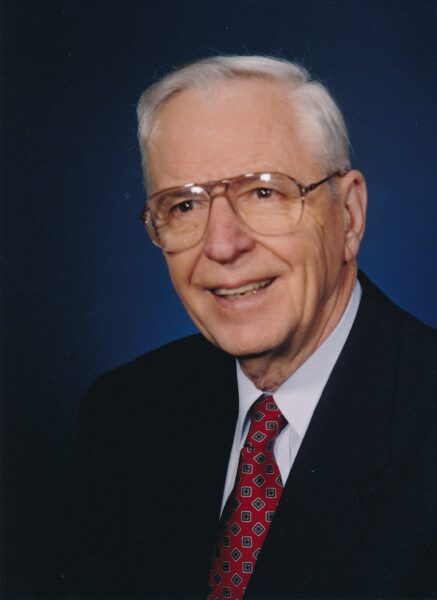
Ernst Breisach. Courtesy Eric Breisach
Ernst A. Breisach, professor of history and department chair at Western Michigan University (WMU) from 1967 to 1989, passed away in Kalamazoo, Michigan, on November 25, 2016, at the age of 93. A masterful teacher, skilled administrator, and brilliant scholar, Ernst was instrumental in establishing the modern foundations of WMU’s Department of History. His scholarship in the field of historiography is internationally recognized.
Born in Schwanberg, Styria, Austria, in 1923, Ernst came of age during Adolf Hitler’s rise to power. Conscripted into the German army, he served on the Eastern Front and was seriously wounded while fighting against the Soviet army. He was discharged after spending two years in military hospitals. Ernst earned a PhD in history from the University of Vienna in 1946 and a Dr. rer. oec (PhD in economics) from the Wirtschaftsuniversität (Univ. of Economics and Business) in Vienna in 1950. Between 1946 and 1952, he taught history and geography at a Realschule (secondary school) in Vienna.
Ernst first came to the United States in 1951–52 on a Fulbright scholarship to study the American higher education system. In 1953, he was hired by Olivet College, where he achieved the rank of associate professor of history. In 1957, Ernst accepted a position as associate professor with Western Michigan College of Education’s Department of History. (The college became known as Western Michigan University in 1957.) Ernst became a full professor of history in 1963 and was elected chair in 1967.
During Ernst’s tenure as chair, the history department initiated nearly all of the programs, with the exception of the PhD, that currently exist. In addition to continuing long-standing support for teacher training—in 1966, WMU ranked second in the nation for total number of certifications for teaching—under Ernst’s tutelage, the department added a major and minor in public history in 1981, making it one of the very few places with an undergraduate focus in that field of history. Ernst also supported the MA program’s primary mission to serve area teachers.
In addition to his teaching and chair responsibilities, Ernst was a prolific and highly acclaimed scholar who was lauded for his painstaking research. He authored or edited seven books—three of which were published during the period he was chair—as well as more than a dozen articles, numerous book reviews, and encyclopedia entries. Although he began his career as a scholar of the Italian Renaissance, his most well-known work focused on the field of historiography. Historiography: Ancient, Medieval, and Modern, first published by the University of Chicago Press in 1983, has since been reissued in three editions and multiple translations. It is widely considered a standard book in the field of historiography. Indeed, many historians know it as a fundamental part of their graduate education. After he retired in 1996, Ernst wrote another highly regarded book in the field of historiography, On the Future of History: The Postmodernist Challenge and Its Aftermath (2003).
Ernst’s meticulous scholarship received national and international recognition. In addition to his Fulbright award, Ernst received the Michigan Association of Governing Boards’ Academic Excellence Award in 1988 and a fellowship from the National Endowment for the Humanities in 1989–90. In 1983, Ernst was one of the first recipients of the WMU Distinguished Faculty Scholar Award, and for 28 years took great pride in chairing the committee responsible for selecting future award winners. Indeed, he was still serving on that committee at the time of his death. In 1998, he was one of six WMU faculty honored for their scholarly achievements as founding members of the WMU chapter of the Phi Beta Kappa national honor society.
Among his many university-wide service commitments, Ernst took special pride in his 30 years of service on WMU’s faculty senate and, especially, his chairing of the former Organization of Chairs of All Academic Departments. He also chaired the WMU Assessment Committee and helped establish a revised general education curriculum in the university.
Ernst was truly a towering figure in the WMU community. A skilled administrator with many opportunities for advancement, he elected to remain in the department, where he could teach and inspire students and govern his own affairs. Ernst was a kind and gentle man with great warmth and wisdom—friends and administrators speak of his “generosity of heart.” He served as a confidant to many on campus who sought his guidance about life or university matters. He shall be missed for his good judgment, intense drive, never-failing politeness, sense of humor, and prolific scholarship. He was consistently charming and witty, even in his last years, when health problems slowed him down.
Ernst found his greatest joy in his family. He was preceded in death by his wife of 66 years, Herma, a historian in her own right. He is celebrated by his brother, Herbert (Elfi) Breisach; daughter, Nora (Rodger) Brannan; son, Eric (Tobi) Breisach; eight grandchildren and eight great-grandchildren; and special friend, Gabriele Hahn. The university, Department of History, former students, colleagues, and friends will miss him greatly.
Wilson J. Warren
Western Michigan University
Shirley A. Ort
University of North Carolina at Chapel Hill (associate provost, emerita)
This work is licensed under a Creative Commons Attribution-NonCommercial-NoDerivatives 4.0 International License. Attribution must provide author name, article title, Perspectives on History, date of publication, and a link to this page. This license applies only to the article, not to text or images used here by permission.